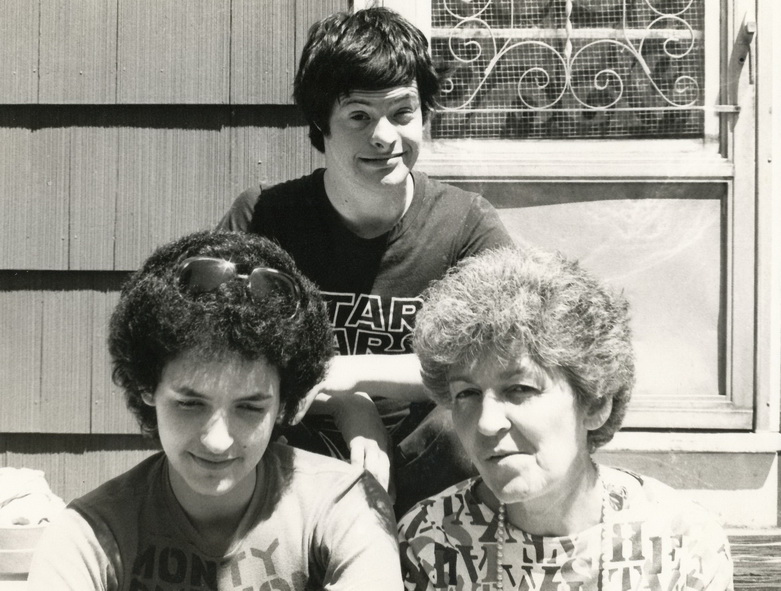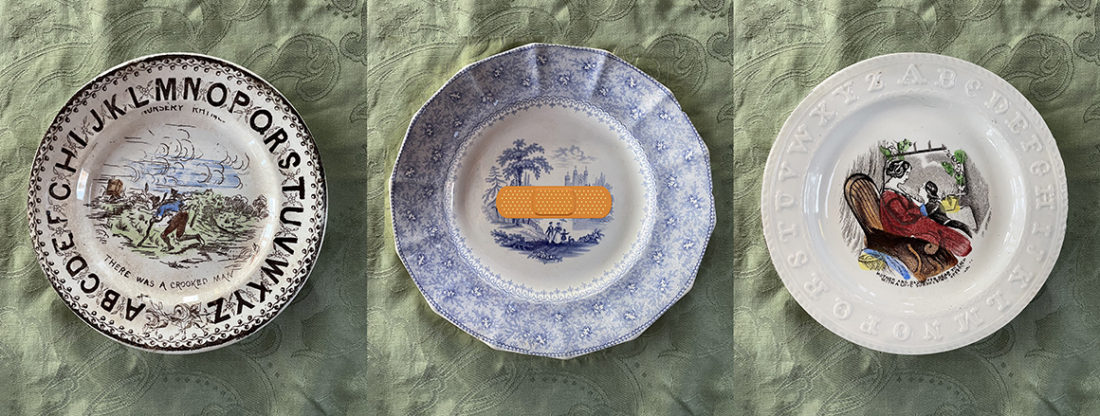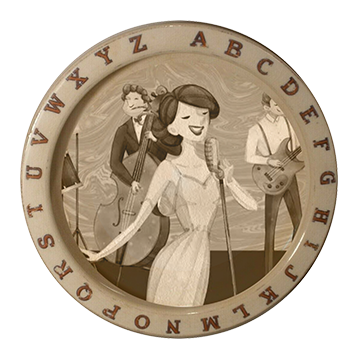Martha was born in 1928 to Portuguese immigrants and learned to speak English in the public schools in Red Hook, Brooklyn. Her brothers served in the military. Her sisters became teachers, then mothers.
Martha married at twenty. At twenty-one she had her first son. Three years later came another son, this one with trisomy 21, then known as Down Syndrome. The hospital assumed she would not take him home and prepared papers for her to surrender him. She didn’t understand. She didn’t sign them. She brought him home and fed him and changed his diapers. Then she had four more children – three girls and a boy. I was the third child, the middle-ish child, just as Martha had been. Later I had the first grandchild of the family, just as she had. We were more alike than I’d for many years admit.
Our childhood was somewhat regimented. We went to school, came when called to dinner at 5:30, were sent to bed at 7:30 after shaking Lassie’s paw on the television. The pediatrician would often see a few of us at a time for checkups. The dentist and orthopedist (we all had flat feet) would have all six of us at one appointment. Rick, the brother with Down Syndrome, often required extra medical attention. He had a weak heart. Sometimes he turned blue and the doctor came to the house. He got pneumonia, had to take penicillin. When he was six, a neighborhood bully stabbed him in the eye. While in the hospital, jumping in his crib, he dislocated his shoulder.
When he was twenty-three, Rick was struck by a motorcycle, while crossing the street. The biker assumed Rick would clear his path in time, unaware of his blind side, much less his mental acuity. Rick didn’t seem too badly hurt, but his neck pain didn’t recede. It was discovered he urgently needed a spinal fusion. For him, the operation was risky: it was not clear that he would survive it, but he was at great risk without it. He did survive. After surgery he was in a Minerva jacket – a cast from head to waist – for six weeks. The cast came off but the bone hadn’t healed. So, he had another Minerva jacket for another six weeks, and a third one.
It was plain the procedure had not been effective. A year later the surgery was repeated. Bone was taken from his hip and grafted into his neck—again. Martha closely monitored every aspect of his recuperation: she didn’t leave his room at St. Luke’s Hospital in Manhattan, except to go the Cathedral of St. John the Divine next door to sit quietly in a back pew.
This alarmed us more than anything. Martha had been raised entirely without religion and had raised us the same way. If she was going into a church, the stress she was enduring had to be unbearable.
This time, fortunately, a halo contraption was used to immobilize Rick’s neck and it finally healed.
After she died, I found notebooks where Martha recorded all the details of one daughter’s bout with mumps encephalitis and another’s hospital stay after being hit by a car. The notes were precise, detailed, and copious. I didn’t know about them when she applied to nursing school just shy of her fiftieth birthday, but I wasn’t surprised by her decision. She’d had plenty of exposure to things of a medical nature by this point. She earned a B.S. in nursing, became an R.N. and worked the Med-Surg unit at St. Vincent’s Hospital in Staten Island. Later she transferred to the Newborn Nursery, from which she retired after twenty years.
In writing about Martha, it’s necessary to recount her many experiences with healthcare and medicine: her youngest brother’s burst appendix; her younger sister’s losing battle with breast cancer; Rick, from beginning to end; her daughter Lisa’s losing battle with brain cancer. But her life had another, maybe stronger, leitmotif, and that was music, specifically popular songs.
Martha loved to sing, and she especially loved to harmonize. It started with the fados in the Portuguese Club in Newark New Jersey. Her father and brother played guitar at the club. Her mother sang snippets of fados around the house. At the merest excuse Martha would start to sing – at a picnic, while driving Girl Scouts, in the supermarket, at the nurse’s station. A phrase or a situation would remind her of a song and, in a clear alto voice, she would launch directly into it regardless of whatever else was then going on. Selma, our childhood friend, remembers her voice as lovely, strong, and full. As her child, I often found it embarrassing or annoying (although as I grew older I frequently engaged in the same habit). At work she was known to have little contests to see which of her colleagues, most much younger than she, knew the songs she would sing. If someone else was singing, she’d throw in a harmony. If a band was playing and she saw the opportunity to get a song in, she would. This is how she got to sing one time with Les Paul at a club where he was performing.
Songs, I later realized, were a way for her to voice feelings, to claim space on an otherwise crowded stage. “Bye Bye Blackbird” (“no one here can love or understand me”) was frequently heard at the breakfast table. (I thought it was about me.) When her sister, the last of her siblings, died in 2019, my cousins asked Martha to speak at the wake. She said she couldn’t think of anything to say. Instead, she stood and sang “I’ll Be Seeing You.”
At the beginning of the Covid pandemic in 2020, Martha still lived, alone, in the house where we grew up. Rick had died in 1994, and Lisa in 2014. Now ninety-two, she drove less often, but was still procuring her own groceries. As everything shut down and shortages spread, we remaining children – dispersed from New Jersey to Massachusetts, and not so young ourselves – scrambled to make sure she had food and necessities. We worried about exposing her to the virus, so my brothers, who lived the closest to our mother, bought groceries and put them in the basement without interacting with her. We talked on the phone every day. It was clear she was increasingly demoralized by the lack of human contact. Then one night she fell in the bathroom and broke her wrist.
She was treated at the hospital, but because of her age and distance from immediate family, after a few days was sent to convalesce at a nursing home. Conversations with her at first were brisk: she reported on her doings and interactions and actually seemed brighter than when she’d been alone at home. She enjoyed having physical therapy. We sent new clothing via Amazon rather than retrieve things from her house. It felt bizarre not to be able to see and visit her, but we all spent a lot of time on the phone with her. And then she got Covid.
During the first week of her illness, she was cared for at the nursing home, but she became weaker and was sent to St. Vincent’s, temporarily we thought. The hospital was overwhelmed with Covid cases and it was almost impossible to talk to a nurse or doctor. Visitors were strictly forbidden. Our mother, who had ministered to so many during her lifetime, was now alone in a fortress.
Although we hoped she’d recover and return to the nursing home, conversations became shorter, quieter, less focused. Often, she was too weak to pick up the phone. It was now December 2020 and none of us had seen her since February.
I called her on Christmas morning. The phone rang and rang, then someone in the room picked up the receiver and handed it to her. Her voice was thin. She wasn’t able to say very much. She seemed to want to go. I told her I loved her. She said “I’ll see you when the lights go back on again in the world.” I put the phone down and, for the first time during the ordeal, sobbed. It was the last thing I heard her say. None of us saw her again. There was no wake, no gathering, just a hollow and unceremonious silence. Her last words to me have often returned with a fresh pang of grief. How unfair it was for her to pass unsung!
It’s now December, 2024. I’ve just read a text message from my oldest daughter. She saw a movie last night, made in 2023. Over the credits, a song popular during World War Two was playing. The song was “When the Lights Go on Again (All Over the World).”
And suddenly my mother’s last words to me transposed from unspeakably sad, to warm and nostalgic. I didn’t realize it then, but Martha had broken into song for me one last time.

- When The Lights Go On Again (All Over the World) - December 11, 2024

